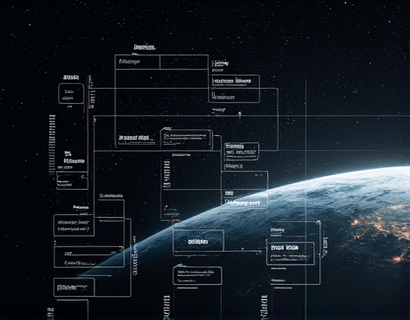Real-Time Government Data: Transforming Civic Engagement with Open Access and Accountability
In recent years, the integration of real-time data access into governance has emerged as a pivotal force in reshaping the landscape of civic engagement. This shift towards open data initiatives represents a significant step forward in creating a more transparent, accountable, and participatory democratic process. By providing citizens with immediate access to government information and operations, these initiatives empower individuals to make informed decisions and actively participate in the governance of their communities.
The concept of open data in government is not new, but its implementation through real-time data platforms has revolutionized how information is disseminated and utilized. Real-time government data refers to the immediate and continuous release of data from various government sectors, including but not limited to, finance, health, education, and public safety. This data is made accessible to the public through online portals and APIs, allowing for seamless integration into various applications and tools.
Enhancing Transparency and Accountability
One of the most significant impacts of real-time government data is the enhancement of transparency and accountability in government operations. When data is readily available and accessible, it becomes easier for citizens to monitor government activities, track spending, and assess the performance of public officials. This level of transparency acts as a deterrent against corruption and mismanagement, as officials are more likely to act responsibly when they know their actions are being watched.
For instance, real-time financial data can provide insights into budget allocations, expenditures, and revenue sources. Citizens can track how public funds are being used, identify potential waste, and hold officials accountable for their financial decisions. Similarly, data on public services such as healthcare and education can be monitored to ensure that resources are being utilized effectively and that service delivery meets the needs of the community.
Empowering Informed Citizen Participation
The availability of real-time data not only increases transparency but also empowers citizens to engage more meaningfully in the democratic process. Informed participation is a cornerstone of a healthy democracy, and real-time data provides the necessary tools for citizens to make educated decisions and take informed actions.
Citizens can use real-time data to stay updated on legislative activities, participate in public consultations, and provide feedback on proposed policies. For example, real-time data on environmental metrics can mobilize communities to advocate for sustainable practices and hold policymakers accountable for environmental stewardship. Similarly, real-time crime data can inform community-led initiatives to enhance public safety and collaborate with law enforcement.
Case Studies: Successful Implementation
Several cities and countries have successfully implemented real-time data initiatives, demonstrating the positive impact on civic engagement and governance. One notable example is the city of Barcelona, which has been a pioneer in open data governance. The city's data portal, Data.Barcelona, offers a wide range of real-time data sets, from traffic and air quality to public services and urban planning. This initiative has not only improved transparency but also fostered innovation, with developers creating applications that enhance the quality of life for residents.
Another example is the United States, where the Open Government Partnership (OGP) has encouraged federal, state, and local governments to adopt open data policies. The Data.gov platform serves as a central repository for government data, providing real-time access to a vast array of information. This has led to increased citizen engagement, with numerous projects and applications developed by developers and civic organizations to address local issues and improve public services.
Fostering Collaboration and Innovation
Real-time government data also plays a crucial role in fostering collaboration between government entities, civic organizations, and the private sector. By providing a common data framework, these stakeholders can work together more effectively to solve complex problems and drive innovation.
For instance, real-time health data can be shared between government health agencies, research institutions, and healthcare providers to monitor disease outbreaks, optimize resource allocation, and develop targeted interventions. Similarly, real-time traffic data can be utilized by transportation agencies, urban planners, and private companies to improve traffic management, reduce congestion, and enhance public transportation services.
These collaborative efforts not only lead to more efficient and effective governance but also create opportunities for innovation. Developers and entrepreneurs can leverage real-time data to create solutions that address specific community needs, from smart city applications to citizen service platforms. This ecosystem of collaboration and innovation is essential for building resilient and responsive governments.
Challenges and Considerations
While the benefits of real-time government data are clear, there are several challenges and considerations that must be addressed to ensure successful implementation. One of the primary challenges is data quality and accuracy. Real-time data must be reliable and up-to-date to be useful. Governments need to invest in robust data collection and management systems to ensure the integrity of the information provided.
Another challenge is ensuring data privacy and security. Real-time data often includes sensitive information, and it is crucial to implement strong security measures to protect against data breaches and misuse. Governments must adhere to strict data protection regulations and best practices to maintain public trust.
Additionally, there is a need for digital literacy and access to ensure that all citizens can benefit from real-time data. Not everyone has equal access to technology or the skills to interpret and utilize data effectively. Governments and civic organizations should invest in education and outreach programs to bridge this gap and promote inclusive participation.
Building a Culture of Transparency
To fully realize the potential of real-time government data, a culture of transparency must be cultivated at all levels of government. This involves not only providing access to data but also fostering an environment where transparency is valued and prioritized. Government officials and institutions must be committed to openness and accountability, recognizing that informed citizens are essential for a thriving democracy.
Transparency should extend beyond data release to include clear communication about government processes, decision-making, and policy implementation. By being transparent about how decisions are made and why certain choices are taken, governments can build trust and credibility with the public.
Conclusion
The integration of real-time data access into governance represents a transformative shift towards more transparent, accountable, and participatory democracy. By providing citizens with immediate access to government information, real-time data initiatives empower individuals to engage more deeply in the democratic process, hold officials accountable, and collaborate on solutions to community challenges.
As more governments embrace open data policies and develop robust real-time data platforms, the potential for positive change is immense. It is essential for citizens, civic organizations, and policymakers to continue advocating for transparency and collaboration, ensuring that the benefits of real-time government data are realized across all communities. Together, we can build a future where governance is not only more open and accountable but also more responsive to the needs and aspirations of the people it serves.










































